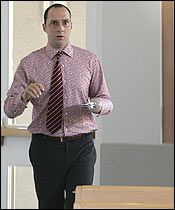
On most sitcoms, it would be notable for one major character to lose an appendage. This year, on Arrested Development, Fox’s brilliant, Emmy-winning, and perpetually imperiled comedy, it seems like everyone’s become an amputee. Buster, the Bluth family’s simpering youngest son, had his hand bitten off by a crazed seal; he’s spent most of the season with a hook. His older brother, Gob, had two fingers lopped off in an errant magic trick. In the same episode, Michael Bluth, the show’s main character, had his calf muscles shortened by an incompetent surgeon. Arrested Development’s been staving off cancellation since its debut in 2003, but it now seems like the show’s producer, Mitch Hurwitz, is dismantling his creation piece by piece. Starting with the characters.
Lots of shows go down guns blazing when faced with their own demise: In their final seasons, Roseanne won the lottery and Felicity started traveling through time. On I Married Dora, an otherwise forgettable 1987 comedy, two characters at an airport shared this exchange: “It’s been canceled.” “The flight?” “No, our series.” The difference with AD, though, is that (a) it hasn’t been officially canceled, and (b) its tenuous status has become an explicit metajoke on the show. When Fox recently cut the show’s season from 22 episodes to 18, the writers had Michael Bluth complain that a construction contract for his company had been cut from 22 houses to, yes, 18. (His father grouses, “I heard about the reduced order. Those bastards!”) On another episode, a lawyer played by Henry Winkler literally jumps a shark.
Sly winks like that aren’t lost on the show’s followers, who gather at online sites like televisionwithoutpity.com and The-OP.com to parse each episode with the seriousness of yeshiva students. (In addition to the reduced-contract gag, fans debated if the Bluth company’s switching offices was a reference to the show’s switching time slots, and if Michael’s unnecessary surgeries symbolized network execs’ creative meddling.) Online fans often overstate their influence, but AD’s followers clearly have clout: After they complained about pop-up ads for The Family Guy obscuring the TV screen, the show made a joke about the ads—an odd, throwaway joke that, frankly, would leave a first-time viewer confused as to what he’d missed. AD’s always been laid thick with gags and references, from the broad to the obscure, which is a large part of its genius. (And, to be fair, Hurwitz had long planned to have Buster lose a limb. It’s just that kind of show.) But in recent weeks, AD’s become an echo chamber of in-jokes and shout-outs, too cacophonous for casual viewers to join the conversation.
A reduced order from the network is reliably a kiss of death, but hopes persist that AD will survive, on Fox or elsewhere. Even if it doesn’t, it’s still nice to see a show get feisty in its final days, rather than plodding regally to its end, suffocated by ticker tape, the way Friends and Frasier did last year. If nothing else, the enfolded metajokes should inspire repeated viewings of the forthcoming DVD of the second season, though it might have to come packaged with a decoder ring. For two years, AD has been the brightest star on the schedule. Now, in its final days, rather than going supernova, it’s folding in on itself, an object of infinite density.